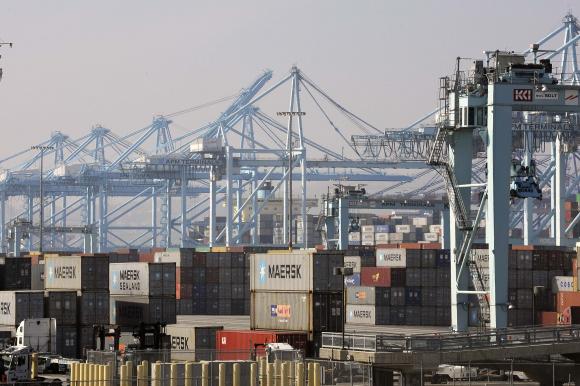Contract negotiators for US West Coast ports reach tentative deal

WASHINGTON (Reuters) - Shipping companies and the dockworkers union reached a tentative labor deal on Friday after nine months of negotiations, settling a dispute that disrupted the flow of cargo through 29 US West Coast ports and snarled trans-Pacific maritime trade with Asia.
The deal, confirmed in a joint statement by the two sides, was reached after US Labor Secretary Thomas Perez arrived in San Francisco on Tuesday to broker a deal with the help of a federal mediator who joined in the talks six weeks earlier.
The White House called the deal "a huge relief" for the economy, businesses and workers. President Barack Obama "calls on the parties to work together to clear out the backlogs and congestions in the West Coast ports as they finalize their agreement," the White House said in a statement.
The 20,000 dockworkers covered by the tentative labor accord have been without a contract since July.
Tensions arising from the talks have played out in worsening cargo congestion that has slowed freight traffic at the ports, which handle nearly half of all US maritime trade and more than 70 percent of the nation's imports from Asia.
More recently, the shipping companies have sharply curtailed operations at the marine terminals, suspending loading and unloading of cargo vessels for night shifts, holidays and weekends at the five busiest ports.
Perez said that as part of Friday's accord, the International Longshore and Warehouse Union and the shippers' bargaining agent, the Pacific Maritime Association, agreed to fully restore all port operations starting Saturday evening.
Perez was sent to California as an emissary for Obama, who had come under mounting political pressure to intervene in a conflict that by some estimates could have ended up costing the US economy billions of dollars.
Perez said he told the union and management negotiators: "You have an obligation to resolve this matter quickly because too many people and businesses are suffering."
In a conference call with reporters following the agreement, Perez said he also had put leaders from both sides on notice that unless they came to terms swiftly they would be "summoned to Washington to continue their negotiations at the White House."
The principal sticking point left to be resolved when he first joined the talks, Perez said, was the arbitration system for resolving workplace disputes under the contract. He did not disclose how that impasse was overcome but said the parties agreed to changes that would improve the system while "ensuring fairness to both sides.
Perez, who had been joined at times this week by US Commerce Secretary Penny Pritzker, had exited the talks Friday morning, after spending four days involved in the bargaining.
Announcement of an agreement on a new five-year labor contract came hours later. The deal is subject to ratification by both parties. No details of the terms were immediately revealed.
Disruptions at the ports, blamed by each side on the other, have reverberated throughout the US economy, extending to agriculture, manufacturing, retail and transportation.
Cargo loads that would normally take a few days to clear the ports have faced lag times of two weeks or more as dozens of inbound freighters stacked up at anchor along the coast, waiting for berths to open.
A longer-term concern has been that US export business lost to other countries and ports may not return once the West Coast dock worker crisis ends.
Port officials have said it will take many weeks to clear the immediate backlog of cargo containers piled up on the docks and several months for freight traffic to return to a normal rhythm.







